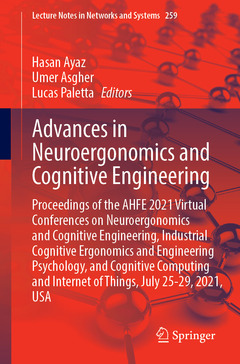Advances in Neuroergonomics and Cognitive Engineering, 1st ed. 2021 Proceedings of the AHFE 2021 Virtual Conferences on Neuroergonomics and Cognitive Engineering, Industrial Cognitive Ergonomics and Engineering Psychology, and Cognitive Computing and Internet of Things, July 25-29, 2021, USA Lecture Notes in Networks and Systems Series, Vol. 259
Coordonnateurs : Ayaz Hasan, Asgher Umer, Paletta Lucas

This book offers a broad overview of the field of cognitive engineering and neuroergonomics, covering emerging practices and future trends toward the harmonious integration of human operators and computational systems. It gathers both theoretical and practice-oriented studies on mental workload and stress, activity theory, human reliability, error and risk. It covers applications in various field, and corresponding strategies to make assistive technologies more user-oriented. Further, the book describes key advances in our understanding of cognitive processes, including mechanisms of perception, memory, reasoning, and motor response, with a particular focus on their role in interactions between humans and other elements of computer-based systems. Gathering the proceedings of the AHFE 2021 Conferences on Neuroergonomics and Cognitive Engineering, Industrial Cognitive Ergonomics and Engineering Psychology, and Cognitive Computing and Internet of Things, held virtually on July 25-29, 2021, from USA, this book offers extensive information and a thought-provoking guide for researchers and practitioners in cognitive engineering, neuroergonomics and their applications.
Reports on emerging practices for better integration of human operators with computational systems
Highlights the cognitive ergonomic aspects in the design of work and play environments
Discusses how to make human-system interaction compatible with human cognitive abilities and limitations
Date de parution : 07-2021
Ouvrage de 536 p.
15.5x23.5 cm
Disponible chez l'éditeur (délai d'approvisionnement : 15 jours).
Prix indicatif 210,99 €
Ajouter au panierThèmes d’Advances in Neuroergonomics and Cognitive Engineering :
Mots-clés :
Monitoring Human Performance; Evaluating Cognitive Workload; Mental Workload Models; Artificial Social Intelligence; Human-machine Collaborative Learning; Modeling Brain Signals; Assessing Cognitive Function; Neurophysiological Assessment of Workers; Measuring Worker Engagement; Visual Cognition; Consumer-behavior Analysis; Attention Analysis Methods; Wearable Biosensors; Measuring Situation Awareness; Cognitive Workload Classification; Emotional Engagement Assessment; Cooperative Teaming; Team Performance Asses



